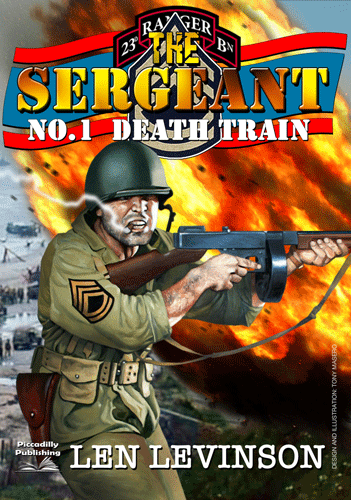My original assessment of the three BRONSON books was off somewhat. While they are written by three different authors, the third book in the series does not start a new character or storyline - it follows the Richard Bronson of STREETS OF BLOOD. This leads me to wonder if the "reboot" of the second book is a reaction to BLIND RAGE and it's less than sympathetic protagonist, and that this was, in fact, originally intended as a long-running series that simply never got off the ground.
In SWITCHBLADE, the story starts off with Bronson and Jenkins hot on the trail of the Unholy Three, a team of punks that have been performing rapes and stabbings and robberies over the last few months. Jenkins is the detective from STREETS OF BLOOD who agreed to help out Bronson as long as he stuck to just killing violent criminals, and as we saw at the end of the second book, Jenkins has gone from passive observer to someone actively helping Bronson.
Bronson tracks the three punks to a shoe store, and arrives just a little too late. One of the punks is in the process of raping the woman who owns the store, and her husband, a paraplegic Vietnam vet in a wheelchair, has been brutally beaten and threatened. This time around, Bronson comes armed not with a shotgun or his Browning, but with a custom-made switchblade, and he kills two of the punks with it in just a few seconds, then runs down and strangles the last punk, a spoiled rich kid named Herbert Vincent Mardin III. "Herbie" is a rich little turd who gets off on power and violence, and he's recruited a couple other youths, one black, one Hispanic, to commit crimes. In stereotypically racist fashion, the black kid is described as only wanting to rape white women, and the Hispanic is only looking to get cash so he can buy pot and get high. Herbie, of course, is in it for the violence.
So, Bronson bumps off Herbie and friends, then goes home only to discover that Nora, his dead wife's sister, is in town and came by for a visit. Nora bears an uncanny resemblance to Bronson's dead wife, and she is clearly looking to sleep with Bronson, who initially protests before giving in, rationalizing it because his usual lay, the model next door, is out of the country on a photo shoot for a month. Nora is savvy enough to not "fall" for Bronson, but the two do fill emotional holes in each other's lives. Bronson finds Nora similar enough to his dead wife to enjoy her company, and Nora finds Bronson interesting and sexy, estranged as she is from her husband, from whom she is seeking a divorce.
Meanwhile, Herbert Vincent Mardin II, Herbie's father, is in a complete state of denial over the circumstances surrounding his son's death. Rather than accepting that Herbie was a violent psychopath, he considers him an "unfortunate victim of today's society" or some other nonsense. He begins digging to find the vigilante who killed Herbie, and when the police (who are tacitly helping Bronson) don't offer much help, Mardin calls in a few favors (He's a top-level executive in an International Bank) from the CIA, who put him in touch with Matthews, a former CIA operative who's been in the world of cloak-and-dagger operations since the days of the OSS. Matthews shows up with a team of other ex-Agency men, and they agree to track down the vigilante killer for a price.
I don't want to go any further into the plot of this book, but I will say the turns the story took were pretty interesting. Bronson finds himself pitted against not only a rogue cop, but these former CIA agents, as well as a trained assassin. There's a lot of move and counter-move as each side tries to get the best of the other, and overall it's a pretty enjoyable read. There's not quite as much over-the-top violence as in the previous two books, but I think the story works well without it, and there's still a good body count for the action junkie readers. There's also quite a bit of sex, as we follow Bronson, Mardin, and even Detective Harper, the rogue cop, into the bedroom with their respective mates.
One plot thread I did find unnecessary involved a diplomat from some "South American Banana Republic" who is portrayed as a violent, woman-beating, murderous lunatic. A number of comments are made regarding how the diplomat is little better than a "primitive savage who doesn't belong in the civilized world" or some such, giving a really racist slant to a story that didn't need to be in the book to begin with. Bronson and Nora run into this creep at the opera, where the diplomat's bodyguards are physically abusing anyone who gets in his way, and Bronson winds up decking one when the bodyguard shoves Nora. This gets blown up in the media to be an "attempted assault" on the diplomat, although no one knows the identity of the assailant. We later learn the diplomat beats up and abandons a girl along the side of the road after an attempted rape, and later kills and wounds a number of people in a drunk driving incident. Of course, due to "diplomatic immunity" (one of the most oft-abused plot devices ever, in my opinion) no one can do anything to the guy. No one, of course, except a Vigilante. Hmmm...
Overall, SWITCHBLADE was pretty good. I don't know if I enjoyed it as much as the second book, but it was certainly enjoyable. I think the author, whoever he was, tried emulating a lot of Len Levinson's style from book 2, but doesn't quite pull it off. Still, it is something of a shame that, after two books of creating a cast of characters, the series ended.




